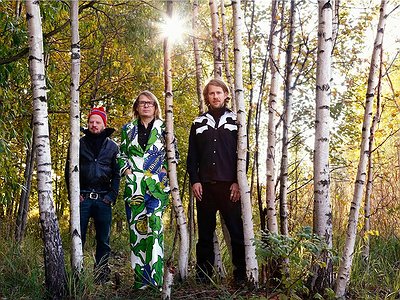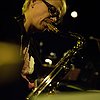Part 2
How do you see the relationship between sound, space and performance and what are some of your strategies and approaches of working with them?
When making songs, I do think a lot about how they would translate to the stage. Playing live is very important to me and normally I have a specific line-up in mind when composing. But on the other hand I also do totally electronic music, so then there are different priorities. Electronic music on stage is a different ball game. A challenge basically.
Derek Bailey defined improvising as the search for material which is endlessly transformable. Regardless of whether or not you agree with his perspective, what kind of materials have turned to be particularly transformable and stimulating for you?
Normally song or themes that are relatively simple have proved to be very good for endless transmutations. But that's my personal view and taste as well. I think your taste is what you bring onstage.
Purportedly, John Stevens of the Spontaneous Music Ensemble had two basic rules to playing in his ensemble: (1) If you can't hear another musician, you're playing too loud, and (2) if the music you're producing doesn't regularly relate to what you're hearing others create, why be in the group. What's your perspective on this statement and how, more generally, does playing in a group compare to a solo situation?
Those are really good rules of thumb. But if next your bass player has the amp on ten and you're trying to play flute I don't see how I could help it by playing lower. The monitoring madness and oversized PA systems have really killed some of the vibe for me over the years. There has been attempts to create a better system, but at the moment this is what we have.
To play in a band that is not 100% your taste is hard. It kills you. Makes you a weak player gradually. I've experienced it and the only thing to do is to leave. The world is full of possibilities. People stick to average bands if they make good money. That's sad.
With more and more musicians creating than ever and more, what does this mean for you as an artist in terms of originality? What are some of the areas where you currently see the greatest potential for originality and who are some of the artists and communities that you find inspiring in this regard?
I don't see any problem. If you do music that stands out, you'll eventually get discovered. It's hard but inevitable. Most bands are unoriginal. OK originality is not rewarded in general, but if you manage to make your living with uncompromising music, that is a big win.
What constitutes a good live performance in your opinion and what’s your approach to performing on stage? How do an improvisation and the recording of this improvisation compare?
There are so many different live music situations that it's a bit hard to nail down what a really good performance is. I guess as a rule of thumb, I would say that if you play just a standard gig and don't really feel much about it, the gig is bad. I don't remember many gigs that I've done as a routine thing. Almost every gig takes too much of my energy. I get very nervous, I try to be focused. I don't like to socialise before show at all. The little details of the show are really secondary issues. Your energy is the key.
Listening is also an active, rather than just a passive process. How do you see the role of the listener in the musical communication process?
I see the audience as an active player in the show. Unfortunately many audiences don't realise that their positive feedback makes the show much better. That's just reality. A cold audience - even when they love your music - is not good enough.
How do you see the relationship between music and other forms of art – painting, video art and cinema most importantly - and in how far, do you feel, does music relate to other senses than hearing alone?
I love all arts and I consider myself involved in all of them at the same time. Performing in a night club is very much visual art as well. All arts are similar in essence.
Reaching audiences usually involves reaching out to the press and possibly working with a PR company. What's your perspective on the promo system? In which way do music journalism and PR companies change the way music is perceived by the public?
I understand the value of PR but I don't much like doing it. But in the digital world one can easily get lost, so a certain amount of PR is OK. I actually enjoy making PR images, good photos.
Do you have a musical vision that you haven't been able to realise for technical or financial reasons – or an idea of what music itself could be beyond its current form?
No, think if you write something good, it will eventually be played. There's always a need for slamming music.
See the world through tenorvision on Jimi Tenor's personal facebook site.






